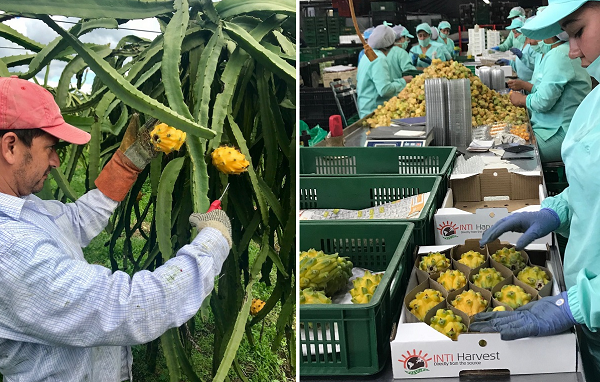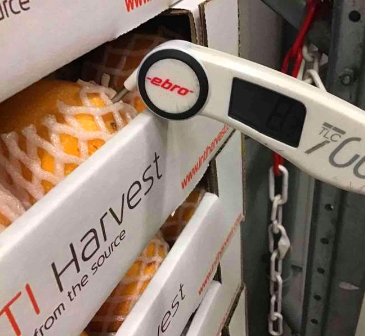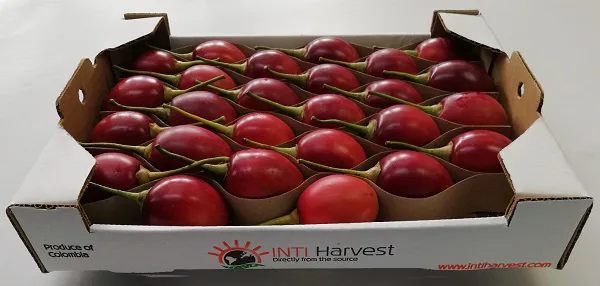Jack Niama, owner of Inti harvest, an import company specialised in the trade of special exotic fruits such as pitahaya, granadilla, tamarillo, pepino, maracuya, passion fruit, physalis, etc., flies often to South America to visit the growers with whom the company has a close relationship and helps them with the sales to Europe. He commits to visit them at least three times a year. Inti Harvest also has a local team comprised of experts in the field who are directly involved with the growers and packing facility operations to ensure every order and consignment that leaves origin is properly shipped.

Inti Harvest cooperates with small and medium-sized cultivation companies in Ecuador and Colombia
In 2020, however, travel to South America became virtually impossible because of the corona virus. "This is unfortunate, but we’ll have to deal with it," Jack says. "We usually visit the growers regularly to give them a bond to the European market, emphasize on quality standards, and show them where their products end up once they arrive in the EU. We often show them how their special exotics are displayed in supermarkets in Germany and Sweden, for example."
 This mainly involves cooperation with small and medium-sized cultivation companies in Ecuador and Colombia that have the potential to export to the European market. "This is where the biggest batches of exotics come from. Those producers often focus on one, or at most two types of exotic fruit, and we help them to comply with the standards and legislation of the EU and requirements of the retail customers we supply. We look at the quality of the product and assess important agricultural and social practices of each producer before we start working with them, we provide advice where necessary and we explain about the benefits of and importance of certifications like Global GAP and Smeta when working with European buyers.
This mainly involves cooperation with small and medium-sized cultivation companies in Ecuador and Colombia that have the potential to export to the European market. "This is where the biggest batches of exotics come from. Those producers often focus on one, or at most two types of exotic fruit, and we help them to comply with the standards and legislation of the EU and requirements of the retail customers we supply. We look at the quality of the product and assess important agricultural and social practices of each producer before we start working with them, we provide advice where necessary and we explain about the benefits of and importance of certifications like Global GAP and Smeta when working with European buyers.
"Next, we can bring together the various types of exotics for transport to Europe. This is usually done by plane although some volume products, mainly physalis and passion fruit, arrive by ship. The consignments of exotic fruit can be relatively small in the off season, but by working with mixed pallets, we have a stronger position in the market. Especially in these times of crisis, it helps to get the limited cargo space for these exotic fruits. Air freight rates have also risen enormously in recent months and we have seen considerable fluctuations which puts pressure on our prices. So we have to look from day to day what the freight rates are but we also try to help each other in the sector to get our volumes on the plane."

Tamarillo
Ecuador is primarily known in Europe as the country of banana production. However, in recent years, the country has been looking to diversify its fruit and vegetable offer. In 2019, Pro Ecuador also announced a greater diversity of fruit and vegetables at the Berlin trade fair.
"Ecuador is increasingly committed to improving the supply of fruit on the world market. They not only have the opportunity to do so, but they can also see what is happening in the surrounding countries. Peru, for example, is much better represented with their diverse range of products. You can already see this commitment in a larger supply of Ecuadorian mangoes and avocados. As a company specialised in this area, we are also able to make our contribution to this expansion by constantly looking to enhance our portfolio of products."
IntiHarvest's sales on the European market are mainly focused on the Dutch, German and Scandinavian markets. "Especially Germany is an important market for us, as we have good cooperation agreements with a number of retailers and buying organizations. We provide them with special exotics all year round. This is different in the Netherlands, for example, where there are higher sales peaks around the holidays, such as Christmas and Easter.
"For Easter we have already started making preparations. The special offers usually start in March in the supermarket, so for exotic fruit that is imported, orders and planning is already taking place. This year, our volumes of exotic fruit have decreased as a result of the lockdowns and uncertainty across Europe. However, this did not prevent our business from growing last year."
Jack also explains that because of this reduced demand, supplies of certain products from South America are somewhat under pressure at the moment. "In South America, they are therefore also looking at other export markets for their products."
Nevertheless, Jack expects Inti Harvest to be able increase the number of programs as the market begins to reopen to achieve further growth in the coming year. "Through the cooperation with the growers in South America we can provide continuity and year-round supply. This enables us to fulfill the programs with our customers while continuing to deliver quality, good customer service and competitive prices."
Inti Harvest
Jack Niama
jniama@intiharvest.com
M: +31 (0)6 1170 2370
T: +31 (0)30 320 0096
www.intiharvest.com
info@intiharvest.com
